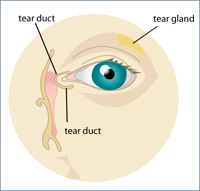 Dry eye is a condition that causes patients to feel like there is a continuous irritation in their eyes. This discomfort is caused by the eye’s inability to produce the right type of tears or tear film. The eye requires a tear film to help protect the eye and to produce tears. Tear film is made up of three layers: an inner mucus layer, a middle watery layer, and an oily exterior layer. Normally, a thin film layer spreads over the eye when you blink, keeping the eye’s surface smooth and clear. If you don’t make enough tears naturally, you may suffer from dry eye.
Dry eye is a condition that causes patients to feel like there is a continuous irritation in their eyes. This discomfort is caused by the eye’s inability to produce the right type of tears or tear film. The eye requires a tear film to help protect the eye and to produce tears. Tear film is made up of three layers: an inner mucus layer, a middle watery layer, and an oily exterior layer. Normally, a thin film layer spreads over the eye when you blink, keeping the eye’s surface smooth and clear. If you don’t make enough tears naturally, you may suffer from dry eye.
If you feel a stinging or burning sensation in your eyes, make an appointment with Dr. Benaim, who can do a thorough eye exam and provide recommendations for relief.
Dry Eye Symptoms
Some dry eye symptoms are more obvious, such as having red or irritated eyes. Surprisingly, however, lots of tears in your eyes can also be a dry eye symptom.
Here are some other dry eye symptoms to look out for:
- Stinging or burning sensation
- A scratchy feeling like something is in your eye
- Stringy mucus in or around your eyes
- Irritated eyes
- Excessive tearing up
- Sensitivity to light, wind or smoke
- Decreased vision
You may also notice that you have trouble focusing on an object or reading. If you experience any of these symptoms, make an appointment with Dr. Benaim.
What Causes Dry Eye?
 There are many factors that can potentially lead to dry eye, which makes it difficult to pinpoint the exact cause. A persistent irritant in the eye may cause the eye to become dry. People who have relatively dry eyes will find it difficult to tolerate continuous contact lens wear, especially for long periods of time.
There are many factors that can potentially lead to dry eye, which makes it difficult to pinpoint the exact cause. A persistent irritant in the eye may cause the eye to become dry. People who have relatively dry eyes will find it difficult to tolerate continuous contact lens wear, especially for long periods of time.
Other causes of dry eye are related to your living environment and lifestyle. For example, if you live in an area where the climate is particularly dry or windy, that can cause dry eye. Looking at a screen, such as a laptop, tablet, or smartphone, for a prolonged period of time can also increase your likelihood of experiencing dry eye symptoms. In this last case, concentrating on activities up close can decrease the rate at which your eyes blink and therefore lubricating the cornea less.
Additionally, dry eye can be a side effect of certain medications, such as allergy or cold medicines. As a result, it’s important to let Dr. Benaim know about any current medications you’re taking.
Dry Eye Treatment in Jupiter, FL
Fortunately, dry eye symptoms are very treatable.
Some options for dry eye treatment include:
- Eye drops — These are artificial tears that can be purchased without a prescription. If you’re allergic to preservatives, you can also purchase preservative-free tears. Traditional treatments can help eliminate the dryness in your eyes, but may not help with the actual tear composition that’s causing the dryness.
- Eye ointments — Depending on the severity of your symptoms, you may need a prescribed eye ointment. Dr. Benaim can make this assessment during your appointment and provide a prescription if necessary.
- Punctal plugs — Tiny silicone plugs are inserted into the inner corner of your upper and lower eyelids, in order to close the tiny openings there. This helps to conserve your own tears.
- Lifestyle changes — Simple changes, such as avoiding hair dryers, staying away from warm rooms, adding moisture to the air in your bedroom with a humidifier, or using artificial tear ointment before bed, can all help to prevent dry eye symptoms. Additionally, avoid having cold AC blow directly in your face and reading under ceiling fans, which can make the eyes feel overly dry.
If you feel you are suffering from dry eye, please make an appointment for a comprehensive eye examination. You will be asked a series of questions about your work/living environment and your lifestyle, including your diet. A tear production test will determine the dryness and the location of the dryness on your eye.
To schedule an appointment, contact our office at 561-747-7777.
 New Address:
New Address: